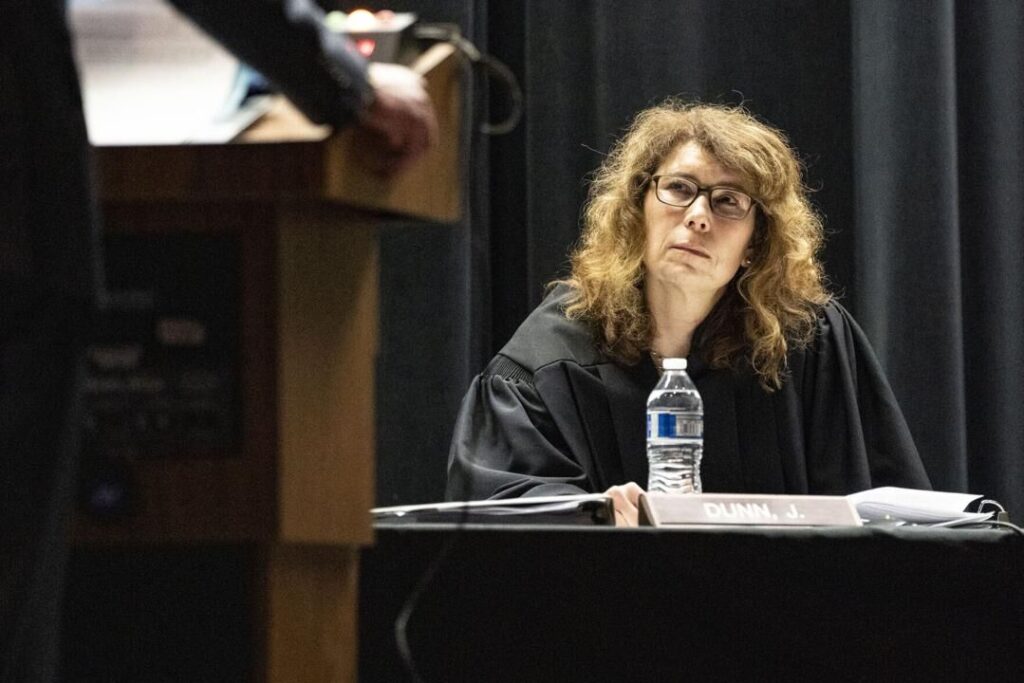Colorado justices talk about their jobs, obligation to be non-political in El Paso County school visit
The Colorado Supreme Court traveled to El Paso County on Thursday, where members fielded questions from high school students on topics that included how they got their seats, what they do to relax, and the best and worst parts of the job.
“I honestly think the worst part of our job is we deal with really sad situations,” said Justice Brian D. Boatright. “I told my kids, when they’re 10 minutes late, I don’t think they’re having fun. I think something’s happened to them. So, your ‘normal’ really gets kind of skewed.”
“Making sure what we write is easily understood and can be applied by our lower courts in a way that doesn’t create problems or mischief — you can get very invested in that work,” added Chief Justice Monica M. Márquez. “Sometimes, you feel like you’re releasing a child into the world when it’s all wrapped up and ready to go.”
The Supreme Court’s trip to Falcon High School in Peyton is part of the long-running “Courts in the Community” program. The state’s appellate courts travel outside of their courthouse in downtown Denver in the spring and fall to hear arguments in schools, then have lunch with students.
It was the first time the Supreme Court came to School District 49, said Falcon Zone Superintendent Brian Smith.
Breanna Ballard, the health academy instructor who helped coordinate the visit with her students, said her class is focused on health law, as the students hope to go into health care. Ballard’s class worked for four months on the event, which included a review of the cases.
“You understand the arguments from the paper perspective,” said student Samantha Mares. “You see the constructive ideas that they’re having and then in real time, you see the differences between those original thoughts and what actually happened.”
The two appeals selected for the event involved a question about local governments’ ability to authorize events that exceed the state’s decibel limits and whether criminal defendants must repay the money police use for undercover drug purchases.
“Our role today was not to be objective. Our role today was to fight for our side,” Erica Romberg, one of the attorneys in the noise case, told the small group of students in attendance. “It does help to have the objective, overarching view of what’s going on because it helps you to be a better advocate for your side. Knowing all the facts helps you keep that bigger, broader picture.”
“You really need to be a counselor. You’re advising clients,” added Julian R. Ellis Jr., who argued opposite Romberg. “They’re coming to you with problems. And you’re helping them work through their problems. That’s something you don’t get to do in a lot of professions.”
Audience members had numerous questions for the criminal attorneys about the nature of their work. Public defender Lisa Weisz said her job entails gaining people’s trust, so that they can eventually open up to her about the details of a case.
“I might have to get to know you a little bit. Talk to you about myself. Disclose information about myself,” she said. “Think about how you connect with other people. And I think prosecutors have to do that same thing sometimes with victims, too.”
“It’s really hard to read the record when you hear that a young child was injured or murdered or assaulted,” said her counterpart, Assistant Attorney General Marixa Frias. “The other thing I think is challenging is I always think my job is to uphold the rule of law. And there are times when I want to concede an issue because it’s the right thing to do. And I’ve done that. But there are some in my office that have a harder time doing that because they’re more prosecutorial.”
To the court, one student asked if members are allowed to affiliate with a political party in their positions. The justices responded they can affiliate and they can vote. But that is the extent of their political participation, unlike other states’ courts where members are elected in explicitly or functionally partisan elections.
“When people ask me about things that are political, I’ll often say, ‘Well, as someone who doesn’t have any First Amendment rights…,'” quipped Justice Maria E. Berkenkotter. “You don’t want people who are ultimately going to decide things like redistricting” to be political.
“We don’t lose our First Amendment rights entirely,” clarified Justice Melissa Hart. “We just have the privilege of not having to talk politics.”
Colorado Politics Must-Reads:

















